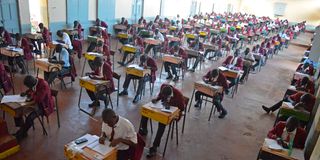Joint exams blind schools from seeing bigger picture

Candidates sitting for the mathematics examination at Kisumu Boys High School on November 6, 2017. The Ministry of Education has banned joint mock examinations.
Last month the Sunday Nation published a report in which a teacher criticised the Ministry of Education for reinforcing the 15-year-old policy banning joint mock and joint school examinations (Blow to learners as Education ministry moves to enforce the ban on mock, joint exams. Sunday Nation, July, 16, 2023)
The reinforcement was made in a circular signed by the Principal Secretary for Basic Education, Dr. Belio Kipsang to all education officials countrywide.
“The Ministry of Education is ill-informed about mocks and joint examinations because as a school we compete with established schools and this gives our candidates good preparation to face the national examinations without much fear,” the newspaper quoted an unnamed mathematics teacher in an unnamed national school in Nakuru as saying.
The ban is based on educational policy, curricular and standards and examinations.
The ban was based on unassailable evidence. Joint mocks and school examinations have created a toxic teaching and learning environment. Schools subject learners to an avalanche of examinations, thereby violating the prescribed curriculum delivery process.
In all educational systems, there is a proportional balance between teaching, learning and assessment.
The best model for preparing learners to face an examination is investing in better teaching and learning and not more and more testing.
One of the findings of the of the Report of the Task Force on Student Discipline and Unrest in Secondary Schools, of 2001, chaired by Naomy Wangai, was that the number of tests done as part of the continuous assessment were too excessive and caused stress to students and were an unnecessary expenditure which often was passed on to parents.
The report accordingly recommended that the government enforces professional balance in teaching, learning and testing in schools with the aim of curtailing unprofessional testing and examinations.
The 2008 circular on guidelines on tuition and mock examinations, signed by the then Permanent Secretary for Education, Prof Karega Mutahi, aimed at implementing this recommendation.
The Clair Omollo Special Investigations Team following students’ unrest of 2016 noted a connection between student unrest and excessive exposure of students to school-level examinations — in gross violation of the recommendations in the Wangai report.
The reinforcement on the ban on mocks and joint school examinations is, therefore, well-informed. The school calendar takes care of teaching, learning and assessment — which are the basic elements of the curriculum delivery process in education systems the world over.
In school systems which appreciates this hallowed trinity in education, assessment is used, not to prepare students for national examinations, important as it might be, but to assess the quality of teaching and learning that has taken place in respect to the previous content taught and learned.
Excellent teaching depends on two critical elements: subject matter mastery and excellent pedagogical knowledge or teaching methods.
To teach well, the teacher must prepare. They must do extensive and sometimes intensive research on the relevant topics or concepts they are expected to teach.
Sometimes going back to the previous topic, to regain the thread or connect points before devolving in the next topic he expects to let students interact with. Without this, there can be no effective teaching. There can be no learning without effective teaching.
An unnecessary number of school-level examinations — whether jointly prepared with teachers in other schools or not — affects the teaching in two ways. It affects the time a teacher ought to spend preparing for the lessons.
The time the students spend taking the examinations interferes with the time they ought to be learning — either during actual instructional hours in the classroom or on their own revising or reading ahead.
In the 2017 report on research into the primary and secondary schools curriculum, the Chief Inspector of Office for Standards in Education, Children’s Services (OFSTED) in England, Amanda Spielman noted: “… the regular taking of test papers does little to increase a child’s ability to comprehend. A much better use of time is to teach and help children to read and read more.
Additionally, the books that teachers read to children need to be more challenging than those the children are picking up themselves.” I hereby provide the link for the benefit the mathematics teacher in the national school in Nakuru and the school head in Naivasha the Sunday Nation quoted. https://www.gov.uk/government/speeches/hmcis-commentary-october-2017
Inexplicably, the USA faces similar problem of assessment dominating schooling more than authentic teaching and learning.
In a foreword to a report entitled ‘Testing More, Teaching Less What America’s Obsession with Student Testing Costs in Money and Lost Instructional,’ the president American Federation of Teachers, Randi Weingarten, says: “… the current testing environment is inhospitable to the knowledge, skills, and abilities we aspire to develop in students.”
Ultimately, education — teaching and learning — creates an environment where students acquire knowledge, a repertoire of critical and conceptual thinking skills, problem-solving and resilience they require in coping with and managing the challenges, risks and crises that life presents them while in school and long after school. It is not limited to passing examinations.
The temptation to focus on national examinations inescapably blinds school administrators and their respective teachers to enduring purposes of education: to develop the power of learners to think, to care and to withstand and cope with seemingly insurmountable situations life will present them, years hence.
The ban on mocks is aimed at re-orienting schooling to focus on the bigger canvas of education away from test or examinations-taking skills.
Examination testing skills are in the final analysis, hot air. They don’t imbue the learners with the knowledge, skills, attitudes, values and habits of thinking and behaviour true education, as embodied in the prescribed curriculum.
- Kennedy Buhere is a Communications Officer, Ministry of Education, Nairobi





